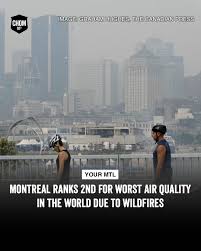Understanding Air Quality in Montreal

The Importance of Air Quality
Air quality is a critical concern for urban areas, significantly affecting public health and the environment. Montreal, as the largest city in Quebec, faces ongoing challenges regarding air pollution from vehicular traffic, industrial activities, and other sources. Understanding the air quality levels in Montreal is essential for residents and policymakers alike, especially as the city continues to grow and develop.
Current Status of Air Quality in Montreal
Recent reports from the Quebec Ministry of the Environment indicate that Montreal has been experiencing fluctuating air quality levels. According to data from the Canadian Environmental Sustainability Indicators, fine particulate matter (PM2.5) concentrations often exceed recommended levels set by the World Health Organization (WHO). In 2023, several high pollution days were recorded, primarily due to weather conditions, traffic congestion, and industrial emissions.
Health Implications
The adverse effects of poor air quality are widely documented. Residents of Montreal experiencing prolonged exposure to air pollutants are at a higher risk for respiratory diseases, cardiovascular issues, and overall reduced life expectancy. Vulnerable populations, including children and the elderly, are particularly at risk. Recent health studies suggest a correlation between air quality deterioration and increased hospital admissions for respiratory-related issues during pollution peak periods.
Initiatives and Improvements
In response to mounting evidence linking poor air quality to public health issues, Montreal officials have embarked on several initiatives to improve air quality. The Montreal Air Quality Monitoring Program implements continuous assessments of air pollutants across the city. Additionally, the city has invested in expanding public transportation, encouraging bike usage, and improving green spaces. The Clean Air Action Plan aims to reduce vehicle emissions and enhance air quality over the next decade.
Conclusion
Air quality is a growing concern for Montreal, with significant implications for the health of its residents. While the city faces many challenges, the commitment to improving air quality through diversified strategies is evident. Looking ahead, continuous public education, government investment, and community engagement will be crucial to foster better air quality conditions. As researchers continue to monitor air quality, it remains essential for residents to stay informed, adopt sustainable practices, and support initiatives aimed at creating a healthier environment.









